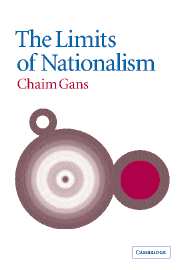Book contents
- Frontmatter
- Contents
- Acknowledgements
- Introduction
- 1 Nationalist ideologies – a normative typology
- 2 The liberal foundations of cultural nationalism
- 3 National self-determination
- 4 Historical rights and homelands
- 5 Nationalism and immigration
- 6 Nationalism, particularism and cosmopolitanism
- 7 Conclusion
- Bibliography
- Index
6 - Nationalism, particularism and cosmopolitanism
Published online by Cambridge University Press: 22 September 2009
- Frontmatter
- Contents
- Acknowledgements
- Introduction
- 1 Nationalist ideologies – a normative typology
- 2 The liberal foundations of cultural nationalism
- 3 National self-determination
- 4 Historical rights and homelands
- 5 Nationalism and immigration
- 6 Nationalism, particularism and cosmopolitanism
- 7 Conclusion
- Bibliography
- Index
Summary
In the last few chapters I discussed several demands that cultural nationalism makes in the public domain. The purpose of the present chapter is mainly to consider some demands that cultural nationalism makes in the private domain. In the first part of the chapter I will discuss the position according to which people are permitted or even required to demonstrate a measure of partiality and special concern for their national group and its members. I will argue that this partiality can be accommodated within the framework of ethical universalism, the position according to which ethics is about ‘individuals with their generic human capacities, considered … as standing apart from and prior to their relationships to other individuals’. I will reject the thesis according to which such partiality could be accommodated only within the framework of ethical particularism. According to ethical particularism, ethics is about agents ‘which … are already encumbered with a variety of ties and commitments to particular other agents, or to groups or collectivities’, ties and commitments which they are born into or into which they grow involuntarily. Later in this chapter, I will discuss the relationship between cultural particularism and cultural cosmopolitanism. The former is the view that it is good for people to be immersed in one particular culture. The latter is the view that it is good for them to shape their lives by means of ideas, texts, customs etc. that they gather from different cultures.
- Type
- Chapter
- Information
- The Limits of Nationalism , pp. 148 - 168Publisher: Cambridge University PressPrint publication year: 2003



